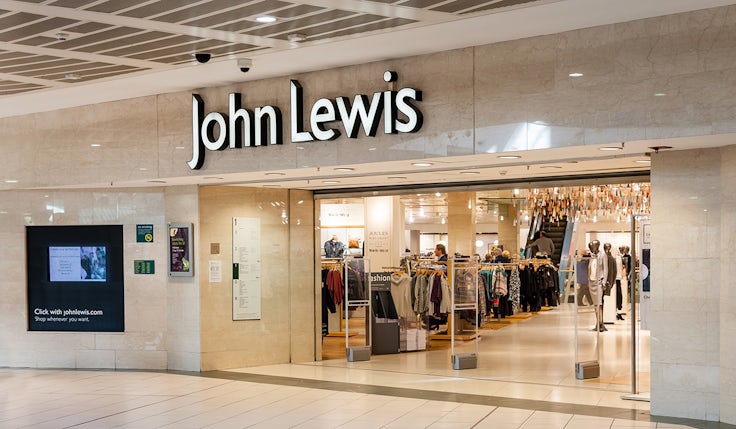John Lewis says new brand promise is ‘fundamental’ to its turnaround
John Lewis & Partners is focusing on affordability as it enters the second half of 2022, ahead of Christmas and the World Cup.

There has been a “good response” to John Lewis’s ‘For all life’s moments’ brand promise, which was unveiled last week, according to chair of the John Lewis Partnership Sharon White.
However, she noted, this is “just the beginning” for the positioning, which replaced John Lewis’s long-standing ‘Never knowingly undersold’ message. She underlined the previous tagline was a “price promise”, which is “extremely different” to the new positioning, which encompasses much more.
“It’s absolutely fundamental to our turnaround plan,” said White, speaking on the company’s half year results call today (15 September). She added the brand positioning will become “very substantial over the next three to five years”, highlighting the company’s long-term commitment to the new proposition.
The five-year plan is a “huge theme” for the company now, added White, given the inflationary environment as it ties into its “lean, simple, fast” effort.
John Lewis executive director Pippa Wicks added that For all life’s moments is “not a marketing slogan” but instead the “spine through a body from which everything hangs off and holds together the John Lewis brand”.
The new positioning comes with a £500m investment into promotions and price, which Wicks said has allowed the company to direct personalised promotions to customers. “It also means we’re in charge of our own destiny as opposed to having to react to what customers do,” she added.
The first half of the year has been about “reinvigorating” the brand and investing in customer experience, she explained, adding “we’ve been very blessed to see like-for-like sales up 3% in the first half, and 30% against 2019”.
However, while customer numbers are up 4%, the partnership made a £99m loss in the 26 weeks to 30 July, amid a combination of inflationary costs, the cost of living crisis and investment in supporting staff, customers and suppliers.
Compared to 2019, John Lewis’s sales rose by 13% on a like-for-like basis, driven by a return to physical retail. The share of sales in shops has averaged 41% for the half year, compared to 26% last half year during the pandemic and 60% pre-Covid. City centre stores have come back most strongly, buoyed by a return to office working.
Meanwhile, fashion has proved the retailer’s best performing category, growing 25% compared to last year with strong sales in holiday wear, while pandemic-fuelled home and technology categories have declined year on year. Compared to last half year, sales of value own brand Anyday are up 28%.
The value range was launched in April 2021 as John Lewis looks to make sure it has “something for everyone’s wallet”.
Wicks said the company is holding prices where it can, with the price of school uniforms the same this year as in 2021, for example.
Tied to this will be the brand’s new store format, “that lives into being there for all life’s moments, not just the big moments, but the everyday moments as well”.
Coming up against the cost of living crisis
The Partnership also unveiled a support package for staff today, including a £500 one-off cost of living payment for employees, either full time or pro-rated, and an increase in pay for its lowest paid staff. The company is also committing to a free food offering across winter.
This ties into what the company is describing as a “conscious decision to forgo profit to provide more support”.
When questioned on whether the Queen’s death will impact customer sentiment, White said “the biggest drag on consumer sentiment ahead of the government’s intervention on energy prices has been energy bills”.
She added she expects the “two year freeze on the cap” to have “quite a profound impact”.
“But we’re not complacent. We are leaning into value in an even more significant way,” she said, adding the retailer is focusing on “more promotions really to tailor to our customers with more understanding of how they’re shopping.”
‘This is not just an ad campaign’: John Lewis repositions with new brand promise“We will be really focused on affordability without letting go of the quality and service that customers expect from the brands,” she added.
In terms of the company’s marketing investment, it doesn’t seem to be cutting back. “One of the ways to drive the business is to maintain the marketing spend and make sure it’s in exactly the right places, so we do look on a daily and weekly basis where we’re getting the best return on investment from the marketing spend,” said Wicks.
Executive director of Waitrose and partners James Bailey added that with marketing investment, it’s a “constant balancing act” but “unless you’re on the front foot, unless you’re in front of customers while they’re making those purchase decisions, you can’t expect the business to sustain in the long term”.
The company emphasised how it is mitigating customers feeling the inflation bite, as it attempts to prevent price increases, noting that gas and electric prices are up 19%, shipping up 164% and supply chain fuel costs up 47%, which is all impacting the partnership.
“Generally, we’ve chosen to forego a profit […] to support our customers. And what that actually means is that we have not passed on all of our cost increases to customers and in fact, of all the electricity, gas, supply chain costs and wages, on our operating costs and driven by inflation, none of them have been passed on to customers,” said executive director of finance, Berangere Michel.
Ahead of the winter period, John Lewis has been “building stock intake” for the second half of the year at a “greater rate” than last year, investing early to ensure it is “ready for the Christmas peak” Wicks said, with 85% of stock already being “in the country”.
There’s also the 2022 World Cup to consider, which Wicks said will be a “lovely time” across both John Lewis and Waitrose.
White concluded by saying the partnership is “confident without naivety” heading into the Christmas period.





